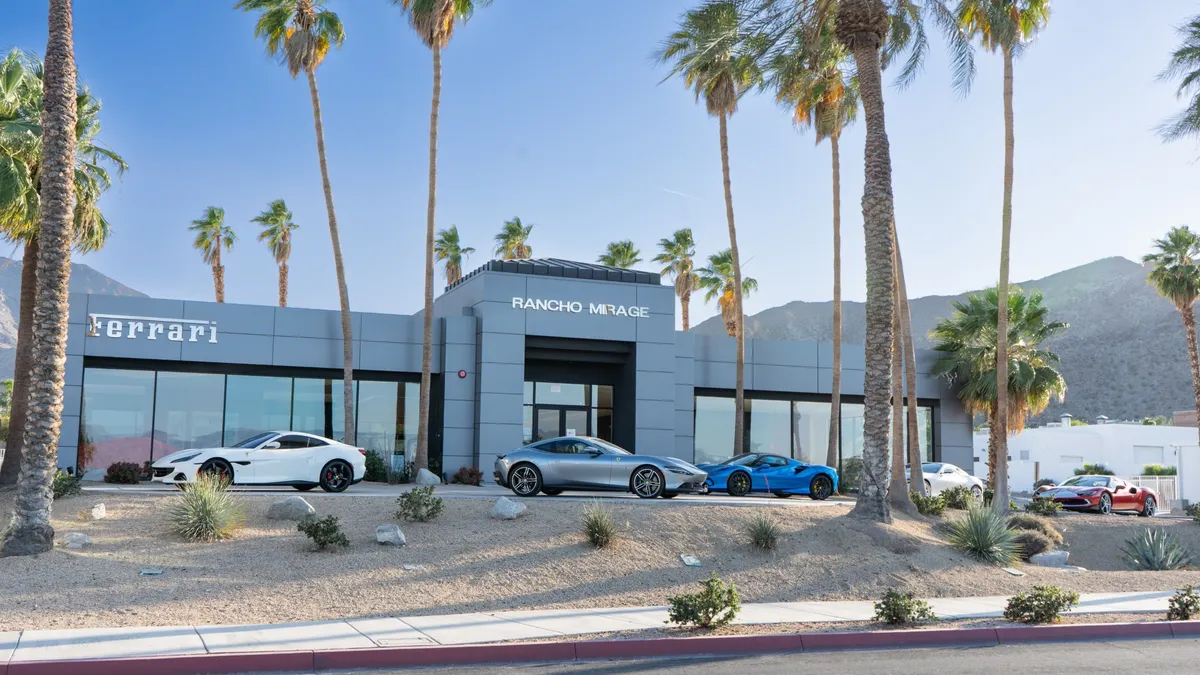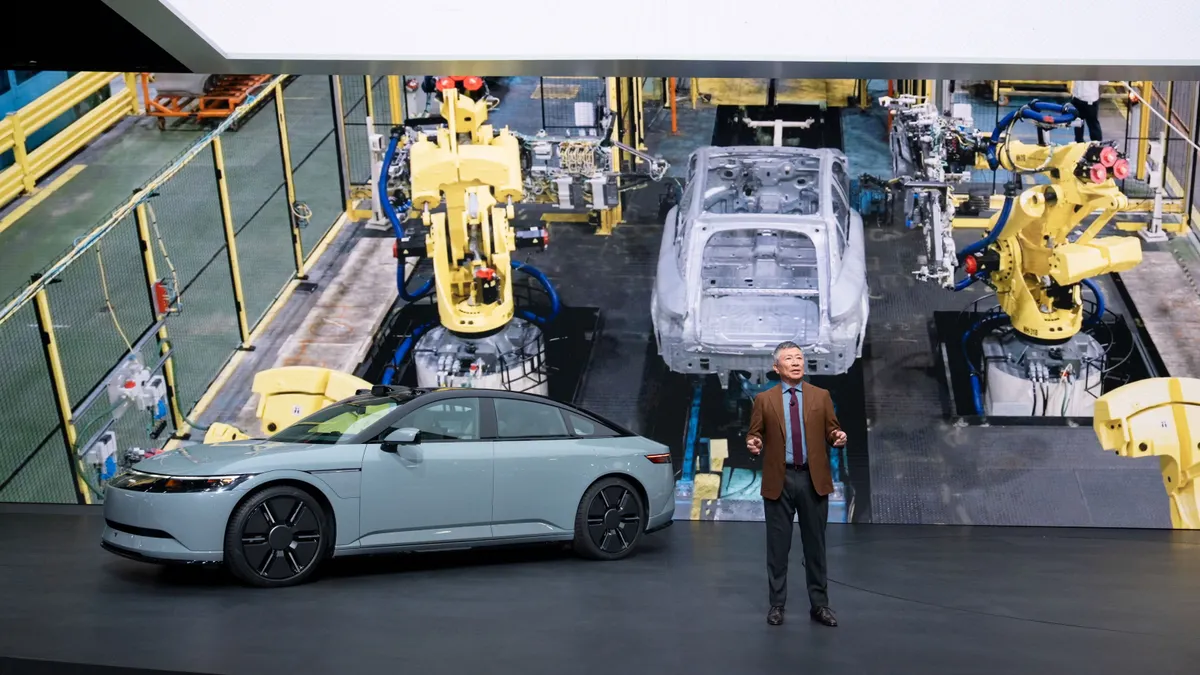Editor's note: This story is part of the WardsAuto digital archive, which may include content that was first published in print, or in different web layouts.
RENNINGEN, Germany – There’s a clock on a white wall, the size of a large porcelain dinner plate, with 12 black hash marks around the perimeter.
Below the timepiece is a glass and stainless steel door to a special creative playground where students and engineers come to doodle with colored chalk or form kinetic sand into shapes that melt away or climb under a black shrouded pod for moments of isolation, maybe even with a laptop computer.
Or, you can peel back the shroud and just sit in this elevated seat facing a window, like a lifeguard, and look down on the treetops of the peaceful German countryside.
Whatever sets your mind free can be found here at Platform 12, the top story of the centerpiece at Robert Bosch’s new research technical center, a 14-building campus newly opened to foster young entrepreneurs, empower start-ups and enable problem solvers in every industry Bosch serves, not just automotive.
Six days a week, 24 hours a day, the door is open to this space, and no one needs to schedule a visit. Someone with a great idea can stand near the door and share it with colleagues seated on old wooden bleachers facing the presenter, as well as the clock on the wall above the door.
Look closely enough and the “Bosch” brand name is visible on the clock. But there’s a problem: It’s got the wrong time, and not by a few minutes. No one sets their watch by it.
The clock is off by several hours and several minutes, intentionally, to be an irritant in a place where conventional time means nothing. The purpose is to change one’s perspective.
“People are irritated if they come in this space and see all these crazy objects,” says Michael Bolle, Bosch’s president-corporate sector research and advance engineering. “They are excited and think about what is happening here.”
10% of Workday for Contemplation
People watch clocks to make sure they make a scheduled meeting or pick up the kids at school on time. But Bosch wants its 1,200 research engineers and 500 student interns working here to feel unshackled by the usual constraints – at least during 10% of their workday.
“This is free time people have in order to do their own research,” Bolle says. “They can for example come to this place here and try things out – experiment, learn and connect with others.”
Platform 12 is a large, open room surrounded entirely by glass on three walls, and the space is peppered with work stations, kind of like exercise machines in a gym. Old, wooden workbenches that inspired innovation decades ago at Bosch facilities are here to do the same today.
The largest object in the room is a pale green steel box resembling a shipping container. On the outside, positioned about eye level, is a flat-screen television with a built-in camera for video chatting with Bosch colleagues at other research centers in Palo Alto, CA, and Pittsburgh in the U.S., as well as Shanghai, Singapore, St. Petersburg and Hildesheim, near Hanover.
“This is our window to the world, I call it,” Bolle says. “We want to network our people also internationally so they can experience what we are doing here.”
Employees and student researchers here represent 40 nationalities from around the world, and the primary language spoken is English, unless all participants in a conversation are German. The last employees moved in three months ago.
The amusing stations scattered about, such as the collection of putters and golf balls painted black to resemble planets or the “time machine” that uses sand from an hourglass to pop a balloon, are here to cultivate ideas.
Bolle says scientists generally need rest and relaxation before doing their best work, and that recreational activities inspire creativity.
Despite all the fun stuff at Platform 12, this playground is not here simply for enjoyment but to plant the seeds for products that someday could become profitable pillars of Bosch’s portfolio.
For instance, since 1995 Bosch has been manufacturing micro-mechanical systems sensors, starting out with automotive applications such as airbags and stability-control systems.
But it wasn’t until about 10 years ago that someone within Bosch decided the company should offer these highly intelligent MEMS sensors for consumer electronics.
Ultimately, It Must Be Profitable
The strategy paid off big time, and Bosch now is the world’s No.1 supplier of MEMS sensors. Three out of four smartphones in the world use Bosch MEMS sensors. This year, the company will produce more than 1 billion of the chips.
It is hardly obvious, but being profitable “is the goal of everything” at Platform 12, says Birgit Thoben, Bosch’s senior innovation manager, who furnished and oversees the room.
“But on the front end, when you are creating ideas, it’s not visible at the end,” she says. “You never know” whether an idea will come to fruition.
She points to the Bosch Ixo, a small battery-operated electric screwdriver that looks like a child’s toy. “It’s very small but very robust,” and the Ixo has become one of the company’s best-selling power tools.
As ideas flourish here, the goal is to score investments from venture-capital companies, most of which are in the U.S.
“Our task is to test very challenging things, and we want our researchers to be courageous,” Bolle says. “This means you have to accept that projects can fail.”
Failure is not acceptable in product development, but it’s OK in this realm. “The team can do a great project with great learning results, but fails,” he says. “This is an important element of learning. Only if you attack those challenging projects and challenging technologies, you are able to learn. You redefine yourself if you fail. But fail fast and fail cheap.”
In another corner of the room, resembling an old library card catalog, is a large rolling cabinet with 26 drawers known as “flight data recorders.” The drawers are not labeled, but visitors to Platform 12 are encouraged to open each one and use whatever is inside – scissors, sticky notes, paper clips, rubber bands, markers.
“Just go on your way. Go on a journey to find things,” Thoben says. Visitors are free to add new items to the drawers, too.
This free-wheeling, artsy environment is common in Silicon Valley and has proven popular among employees who may find Bosch’s corporate culture more conservative.
“We do this because we think it is very important for innovation to create this kind of atmosphere,” Bolle says.



















